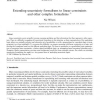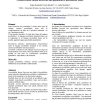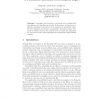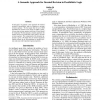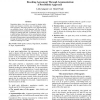104
Voted
IPMU
2010
Springer
15 years 20 days ago
2010
Springer
Controlled Query Evaluation (CQE) is a logical framework for the protection of secrets in databases. In this article, we extend the CQE framework to possibilistic logic: knowledge ...
127
click to vote
INFFUS
2006
15 years 2 months ago
2006
This paper addresses the problem of merging uncertain information in the framework of possibilistic logic. It presents several syntactic combination rules to merge possibilistic k...
112
click to vote
IJAR
2008
15 years 2 months ago
2008
Linear constraints occur naturally in many reasoning problems and the information that they represent is often uncertain. There is a difficulty in applying AI uncertainty formalis...
137
Voted
FSS
2008
15 years 2 months ago
2008
In the last decade defeasible argumentation frameworks have evolved to become a sound setting to formalize commonsense, qualitative reasoning. The logic programming paradigm has s...
117
Voted
UAI
2004
15 years 3 months ago
2004
Humans currently use arguments for explaining choices which are already made, or for evaluating potential choices. Each potential choice has usually pros and cons of various stren...
104
Voted
FLAIRS
2004
15 years 3 months ago
2004
In possibility theory, there are two kinds of possibilistic causal networks depending if possibilistic conditioning is based on the minimum or on the product operator. Similarly t...
106
click to vote
DLOG
2007
15 years 4 months ago
2007
Possibilistic logic provides a convenient tool for dealing with inconsistency and handling uncertainty. In this paper, we propose possibilistic description logics (DLs) as an exten...
109
Voted
AAAI
2008
15 years 4 months ago
2008
In this paper, we propose a new approach for iterated revision in possibilistic logic by applying a one-step revision operator. We first argue that the set of KM postulates for re...
138
Voted
KR
2004
Springer
15 years 7 months ago
2004
Springer
In this paper, partial knowledge about the possible transitions which can take place in a dynamical environment is represented by a set of pairs of propositional formulae, with th...
146
Voted
KR
2004
Springer
15 years 7 months ago
2004
Springer
Negotiation plays a key role as a means for sharing information and resources with the aim of looking for a common agreement. This paper proposes a new approach based on possibili...

